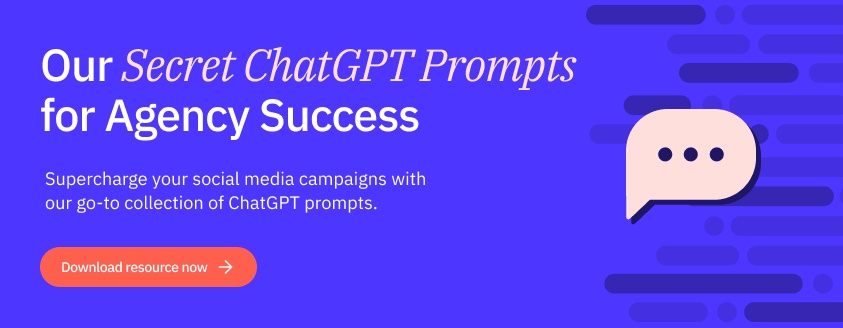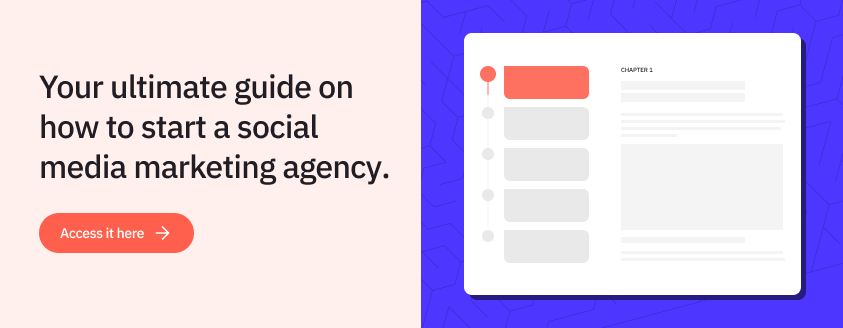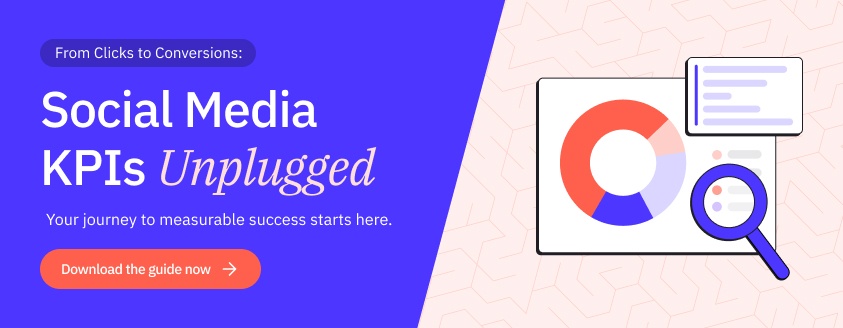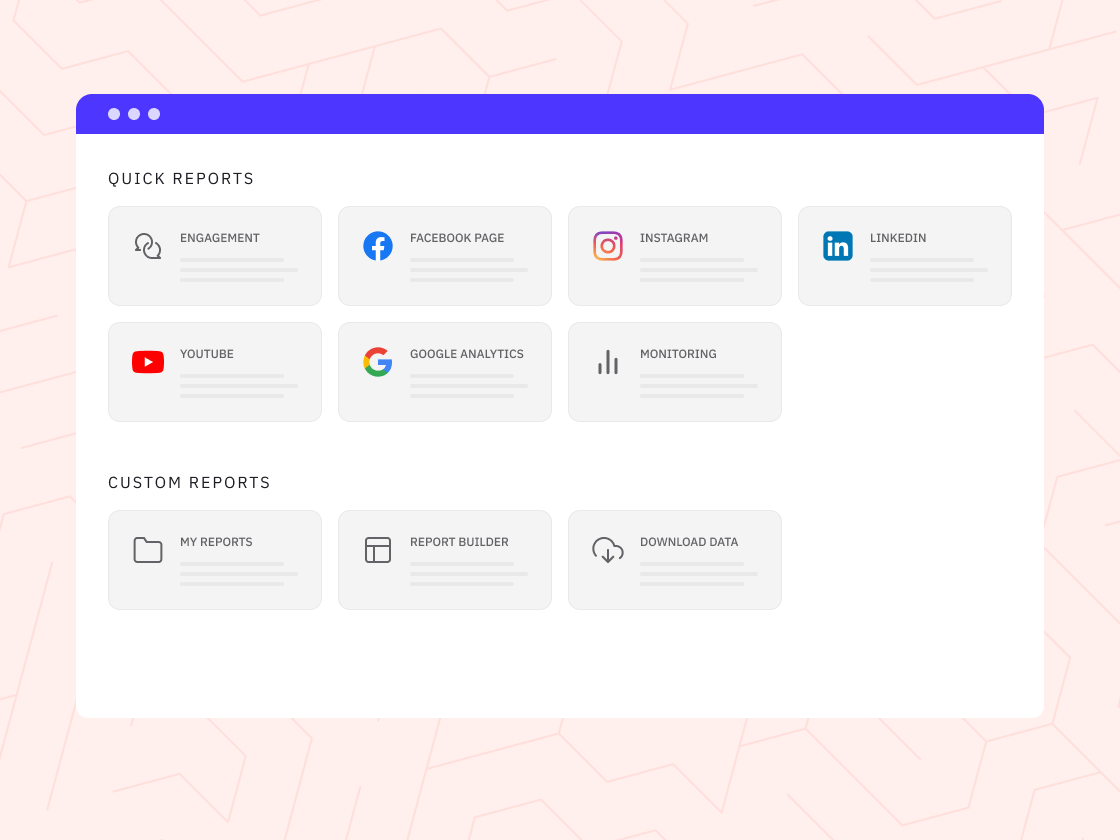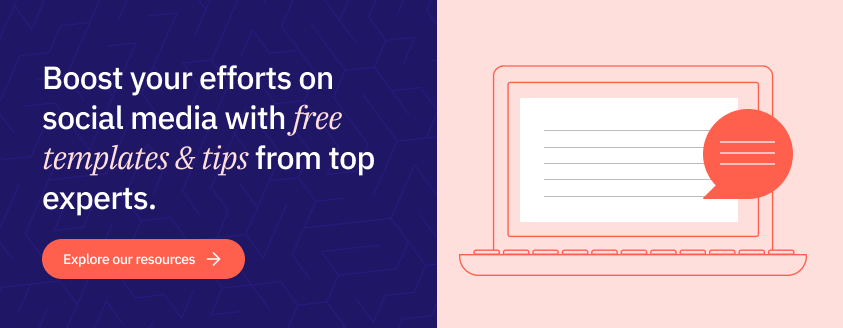Artificial Intelligence (AI) is rapidly transforming the way we use social media.
With AI, agencies and social media marketers can enhance their strategies, optimise their work, and boost their clients' presence on social media platforms.
But how can you use AI in social media, and why is it so important?
In this article, we'll explore the world of AI in social media marketing, from its basic definition to the tools and strategies that digital marketing agencies and marketers can use to leverage its power.
Here's a sneak peek of what you'll find in this article:
- How AI is transforming social media
- Advantages of using AI in social media
- Trending content creation AI tools for 2023
- AI in social media strategy
- Potential challenges and ethical considerations
How AI is transforming social media
Social media is evolving rapidly, and AI is at the forefront of that change.
Artificial intelligence enables marketers to offer personalised recommendations, create more efficient customer service, analyse data in real time to help improve overall marketing campaign performance, and so much more.
So let's dive into the five ways AI in social media transforms social media marketing:
- Content generation
- Personalised recommendations
- Chatbots
- Image and speech recognition
- Sentiment analysis
Content generation
Generating content with AI tools is one of the leading 2023 social media trends.
With the rise of social media platforms’ impact and ever-increasing user demands, there is a growing need for high-quality, engaging, and personalised content in marketing strategies.
And this is precisely how you can use AI tools to your advantage.
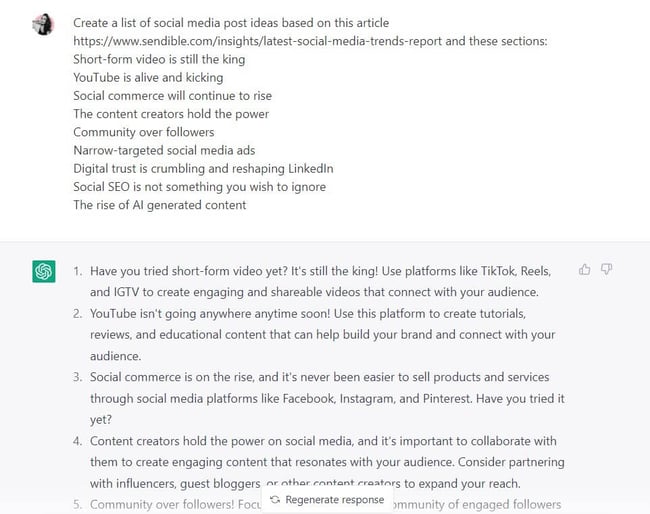
AI generated content is created using artificial intelligence tools such as natural language processing, machine learning, and computer vision.
So it doesn’t come as a surprise that using these tools can result in faster content creation, increased personalisation, and cost savings.
Personalised recommendations
One of the most significant changes brought by artificial intelligence is personalised recommendations.
Machine learning algorithms analyse user data to deliver content that aligns with their interests.
For example, social media platforms like Facebook, Instagram, and TikTok use AI algorithm to analyse users' behaviour, including the content they like, share, and comment on.
Even our tool here at Sendible focuses on providing analytics and reports so clients can make decisions regarding their social media strategy using this valuable data.
This data is then used to deliver personalised recommendations for each user.
Using data gathered by AI is also a huge part of a brand's social listening process which can then lead to better marketing decisions based on the data.
Chatbots
Chatbots are another application of artificial intelligence tools that can help social media marketers.
They can provide customers with instant answers to their queries 24/7 and handle more complex tasks.
With natural language processing (NLP), chatbots can provide personalised and meaningful interactions that mimic a human's tone and style.
Image and speech recognition
Image and speech recognition are becoming increasingly important in social media marketing.
Instagram, for example, uses image recognition to identify the content of a photo or video and use it to offer more relevant content to users.
Speech recognition can also be used for social media analytics to understand the sentiment behind posts and messages.
Sentiment analysis
Sentiment analysis is the process of using artificial intelligence to analyse social media data to determine the sentiment behind it.
It is often used to gauge the overall feeling towards a brand, product, or topic.
Social media agencies can use sentiment analysis to identify the tone of the conversation, understand their audience's preferences and respond accordingly.
Overall, artificial intelligence is transforming social media by making it more personalised, efficient, and effective.
As AI technology continues to improve, we can expect more innovative applications and use cases to emerge.
Advantages of using AI in social media
Using AI in social media offers several advantages social media marketers can leverage to achieve better client results. Here are some of the key benefits:
- Increased efficiency and accuracy
- Better audience targeting
- Improved customer service
- Cost reduction
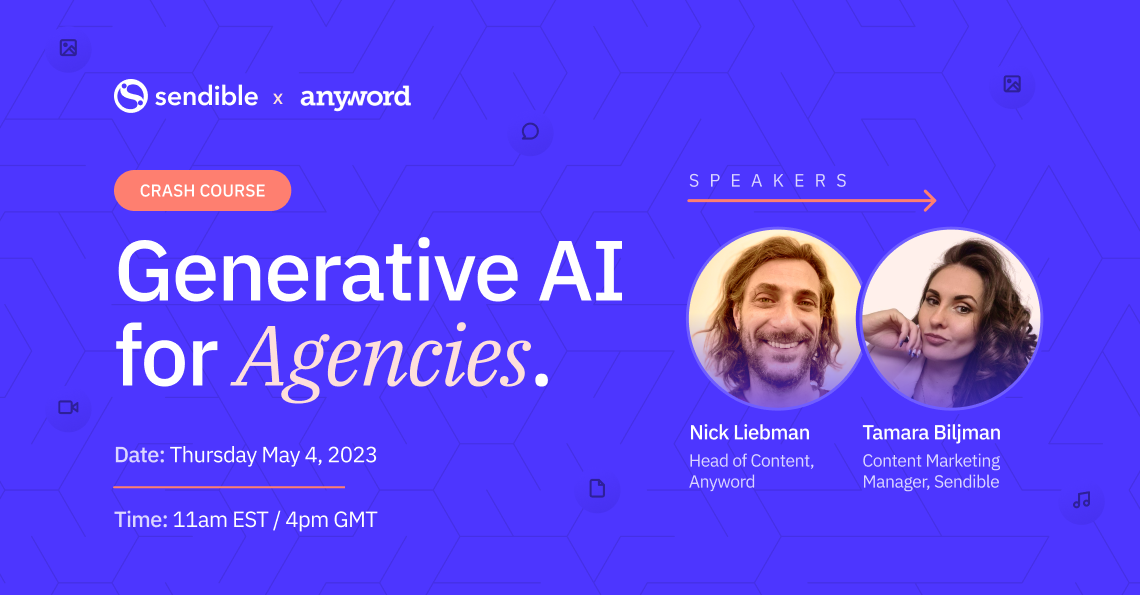
Crash Course: Generative AI for Agencies
Generative AI is here and it is changing the way social marketers do their jobs. But how do you use AI for maximum impact?
Increased efficiency and accuracy
By using AI, social media agencies can increase their efficiency and accuracy in delivering content and analysing data.
AI-powered tools can automate many tasks, such as generating ideas, optimising content creation, and analysing its performance.
Not only can they help your marketing team save precious time, but they'll help you say goodbye to creative blocks.
Better audience targeting
Another benefit of using AI in social media is better audience targeting. AI-powered tools can analyse user behaviour, demographics, and interests to identify the most relevant audience for a particular campaign.
This means businesses can deliver content that is more likely to resonate with their target audience, increasing engagement and conversion rates.
Improved customer service
AI-powered chatbots can provide 24/7 customer service, reducing response times and improving the overall customer experience.
With NLP, chatbots can provide personalised and meaningful interactions that mimic a human's tone and style, making it easier for customers to get the help they need.
Cost reduction
Businesses can reduce their social media marketing strategy costs and overall marketing costs by automating tasks using social media AI and in turn improving efficiency.
AI social media tools can analyse data and provide insights that would take human analysts hours to produce (such as keyword research and idea generation), reducing the need for manual labour and the associated costs.
Overall, using AI in social media can help businesses achieve their goals faster, more accurately, and at a lower cost.
By automating routine tasks and providing valuable insights, marketers can focus on creating high-quality content and engaging with their audience, ultimately improving their presence on social media.
Trending content creation AI tools for 2024
One of the most significant advantages of AI in social media is its ability to generate high-quality content efficiently.
Here are some of the top AI-powered content creation tools for 2024 that social media agencies can use to take their content game to the next level:
Idea generation
- MarketMuse - an AI-powered content strategy platform that helps improve content quality by analysing and optimising its relevance, depth, and authority.
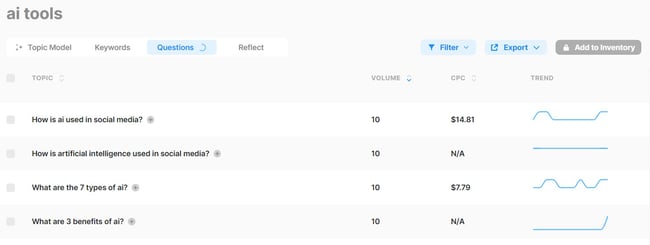
- IdeaNote - an idea management tool that uses AI to generate new ideas, curate content, and identify trends from online sources.
Text creation
- ChatGPT - an OpenAI-powered language model that generates human-like text for various applications, including social media captions, blog posts, and product descriptions. Get started creating amazing social media content with our free ChatGPT prompts.
- Copy.ai - an AI writing assistant that generates high-quality marketing copy, blog posts, and social media content.
- Jasper - an AI content creation platform that uses natural language generation (NLG) technology to produce written content in various styles and tones.
- Anyword - an AI-powered copywriting tool that uses machine learning to optimise marketing messages and ad copy.
- Contenda - a content creation platform that uses AI to analyse top-performing content and generate insights for creating high-quality content.
- Writesonic - an AI copywriting tool that generates high-quality content in seconds.
- Hypotenuse AI - a content optimisation tool that uses AI to generate and test multiple variations of headlines, meta descriptions, and ad copy.
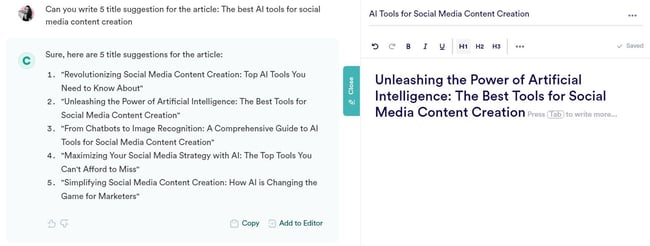 One of the best practices (so far) is to start with the title, then an outline, and once you're happy, start building the article section by section. You can also use these tools for social media post ideas to promote content of choice, or write copies for various purposes. (screenshot of Copy.ai)
One of the best practices (so far) is to start with the title, then an outline, and once you're happy, start building the article section by section. You can also use these tools for social media post ideas to promote content of choice, or write copies for various purposes. (screenshot of Copy.ai)
Video creation
- Runway - a deep learning platform that enables users to create and manipulate videos with AI-powered tools and effects.
- Tavus - an AI-powered video editing tool that automates the video creation process and adds special effects and animations.
- Synthesia - an AI video generation tool that allows users to create personalised videos using AI-generated voiceovers and visuals.
- Hour One - an AI video production tool that automates the video creation process by generating scripts, storyboards, and animations.
- Rephrase.ai - an AI-powered video editing tool that allows users to edit videos easily by removing, replacing, or adding elements.
- ElevenLabs - an AI video creation platform that uses machine learning to generate video content from existing text, images, and video footage.
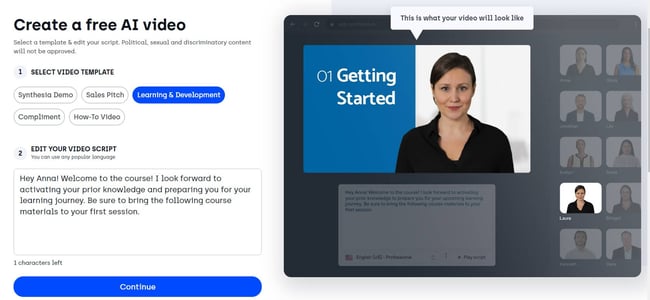 Source: Synthesia
Source: Synthesia
Image creation
- Stability AI - an AI-powered platform that generates custom illustrations and graphics based on a user's description or keywords.
- Lexica - an AI-driven creative tool that uses generative adversarial networks (GANs) to create unique and personalised images.
- Midjourney - an AI image creation platform that uses neural style transfer to create stunning and unique images.
- Diagram - an AI-powered platform that enables users to create custom images and graphs with a simple drag-and-drop interface.
- Lensa AI - a computer vision technology that utilises artificial intelligence and deep learning to create stunning and creative photos from ordinary images.
 Source: @rileybrown.ai
Source: @rileybrown.ai
AI Integration on Existing Platforms
With the rise of artificial intelligence, many software companies have been incorporating AI into their platforms to improve user experience and boost productivity.
From image and video creation to content ideation and management, AI-powered tools are becoming essential for social media professionals.
Here are some popular platforms that have successfully integrated AI into their offerings:
- Adobe Creative Cloud offers several AI-powered tools for image creation and editing, including Adobe Sensei, which uses AI and machine learning to enhance the performance and capabilities of various Adobe products.
Some of the specific tools that incorporate AI include Adobe Photoshop, which features an AI-powered neural filter for image editing, and Adobe Stock, which uses AI to help users find and select relevant images more quickly and easily.
Additionally, Adobe's Project Cloak uses AI and machine learning to intelligently remove unwanted elements from images, while Adobe Fresco incorporates AI-powered brushes for more realistic and natural-looking digital painting. - Canva is an online graphic design platform that provides a range of tools for creating visual content, including social media graphics, posters, logos, and presentations. Canva also offers AI-powered features such as magic write, automatic resizing, magical recommendations, convert docs to decks, and image enhancement to help users easily create professional-looking designs.
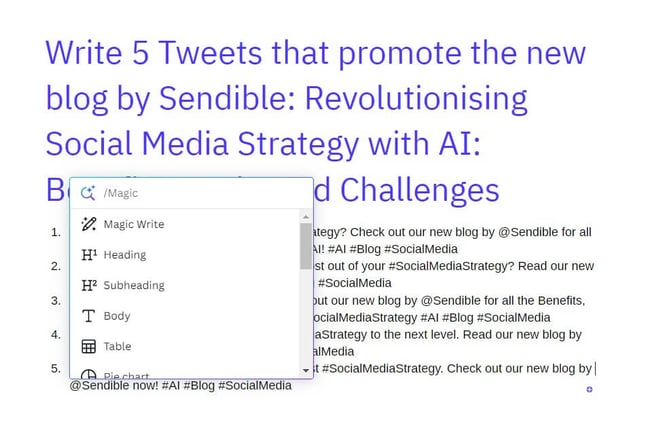
- Microsoft has been working on integrating AI into its Office suite to improve productivity, making everyday tasks easier and faster. With AI's help, users can optimise their workflow, get real-time suggestions and feedback, and make data-driven decisions. For example, AI will enable PowerPoint to suggest more effective ways to present your slides, Excel to perform data analysis more quickly, and Word to provide more accurate grammar and style suggestions.
- Google Workspace, which includes applications like Gmail, Google Drive, Google Docs, and Google Sheets, has already integrated AI in various ways, such as Smart Compose and Smart Reply in Gmail and Google Chat, Explore in Google Docs and Sheets, automated built-in summaries for Google Docs, Portrait Restore in Google Meets to enhance your video, and more. Google has also announced plans to continue to invest in AI and machine learning to improve its products and services.
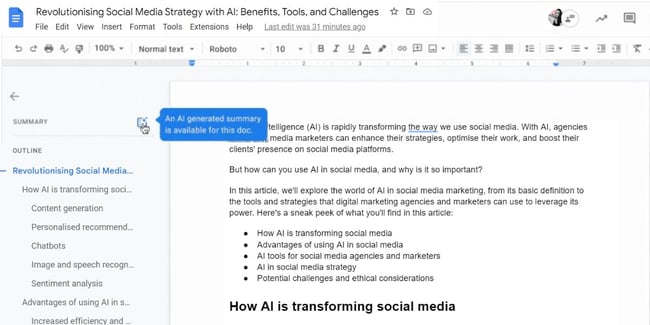
Using AI-powered content creation tools can help social media agencies save time and effort in creating high-quality content for their clients, allowing them to focus on other essential tasks like engagement and community management.
- Notion, an all-in-one workspace, introduced various AI integration tools allow users to automate routine tasks, collaborate more efficiently, and gain insights into their data.
With AI-powered features such as automatic database linking, real-time collaboration, and intelligent sorting and filtering, Notion helps users work smarter and more efficiently. The platform also provides AI-powered insights that enable users to identify trends, track progress, and make data-driven decisions.
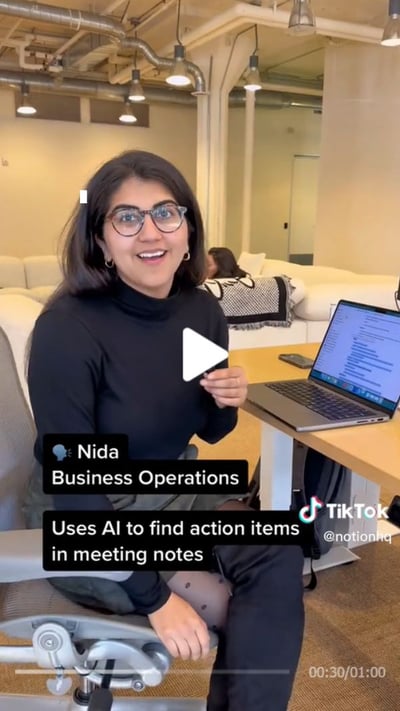 Source: @notionhq
Source: @notionhq
AI in social media strategy
As AI technology advances, social media agencies must learn how to integrate it into their existing social media strategy. Here are some steps to take:
- Defining goals and objectives
- Selecting the right AI tools
- Integrating AI into existing social media strategy
- Measuring success and adapting strategy accordingly
Defining goals and objectives
The first step is to define your social media goals and objectives.
- What do you want to achieve with your social media presence?
- Are you looking to increase engagement, boost conversions, or improve customer satisfaction?
Defining your goals and objectives will help you select the right AI tools and measure success.
Selecting the right AI tools
Once you have defined your goals and objectives, the next step is to select the right AI tools to achieve them.
Many AI tools are available for social media agencies to choose from, and it's important to select the most relevant to your goals.
Consider the tools we discussed in the previous section, and determine which ones will be most useful to you.
While we highly encourage experimenting, you do not want to waste time on shiny new tools that won't bring you any closer to your long-term goals.
Integrating AI into existing social media strategy
After you have selected the right AI tools, it's time to integrate them into your existing social media strategy.
This involves identifying the areas where AI can be most helpful, such as content creation, content repurposing, influencer marketing, ad targeting and optimisation.
Consider the ways you can incorporate these tools into your existing processes.

How To Leverage AI for Social Media Posts: Take Your Content To the Next Level
Measuring success and adapting strategy accordingly
Finally, it's essential to measure the success of your AI-powered social media strategy and adapt it accordingly.
On the one hand, this involves monitoring metrics such as engagement rates, click-through rates, conversions, and customer satisfaction.
On the other, compare the time invested into production, cost reductions, and content creation efforts in general.
Use these metrics to evaluate the effectiveness of your strategy and make any necessary adjustments to improve results.
Potential challenges and ethical considerations
While artificial intelligence can benefit social media agencies immensely, it is important to recognise and address its potential challenges and ethical considerations.
Privacy concerns
Privacy is one of the main concerns with using artificial intelligence in social media.
As AI relies on data to operate, there is always a risk of data breaches or misuse.
Social media agencies need to ensure that the AI tools they use comply with data protection regulations and have proper security measures in place.
Bias and discrimination
Artificial intelligence is only as unbiased as the data it is trained on.
If the data used to train AI is biased, it can further discriminate and perpetuate inequalities. Social media agencies need to be aware of this and take steps to ensure that the AI tools they use are trained on diverse and representative data.
Dependence on technology
While artificial intelligence can improve efficiency and accuracy, it can also create a dependence on technology.
Social media agencies must ensure that they balance the use of AI and human input to prevent a complete reliance on technology.
Need for human oversight
Artificial intelligence is still in its early stages, and while it can perform many tasks independently, it still requires human oversight.
Social media agencies need to have a system in place for reviewing and verifying AI-generated content and addressing any errors or mistakes made by AI.
Over to you, fellow marketers
As social media plays an increasingly vital role in marketing and advertising, it's no surprise that more companies are turning to AI-powered tools to optimise their social media strategies.
The benefits of using AI in social media are clear, from personalised recommendations to increased efficiency and accuracy.
Incorporating AI tools into social media strategies can lead to better audience targeting, improved customer service, and cost reduction.
Trending content creation AI tools like MarketMuse, IdeaNote, chat GPT, and Stability.ai are just a few examples of how AI can help create content quickly and effectively, from ideation to publication.
But when selecting AI tools, it's important to consider your social media strategy's specific needs and goals.
On another note, it's essential to consider potential challenges and ethical considerations, such as privacy concerns, bias and discrimination, dependence on technology, and human oversight.
Social media agencies must be cautious when incorporating AI into their strategies, ensuring that they consider potential risks and use AI tools responsibly and ethically.

